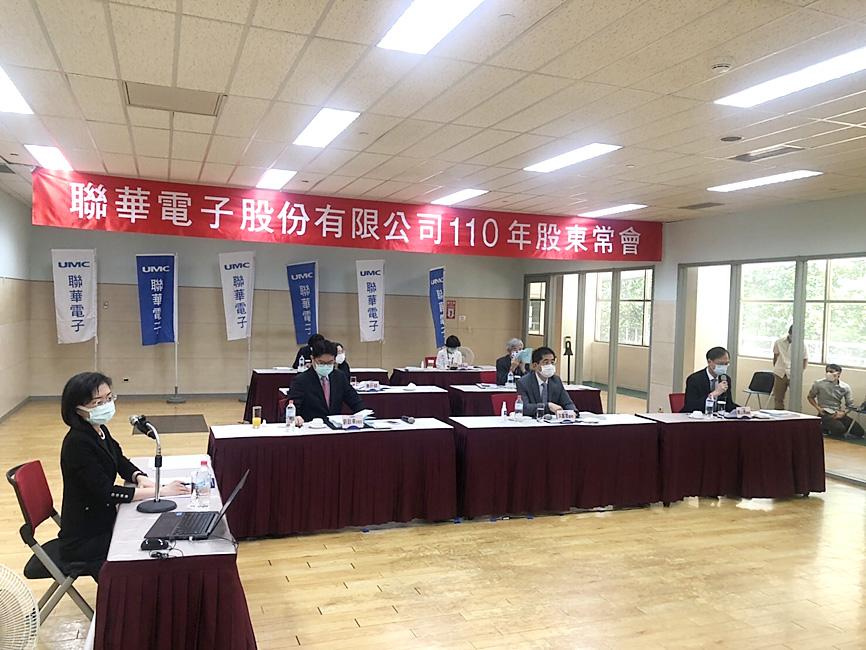The global semiconductor shortage is expected to last until 2023 as the COVID-19 pandemic boosts demand for chips for automobiles and smart home devices, United Microelectronics Corp (UMC, 聯電) copresident Chien Shan-chieh (簡山傑) said yesterday.
Speaking at the company’s annual general meeting in Hsinchu, Chien said that while the COVID-19 pandemic has had an adverse impact on the global economy, digital transformation has accelerated growth in the semiconductor industry.
Chip supply would fall short of demand and only worsen in the short term, with a shortage of 8-inch and 12-inch wafers set to be the most severe, Chien said.

Photo: Grace Hung, Taipei Times
As demand continues to soar, the global chip shortage is likely to last beyond next year until 2023, he said.
To solve the problem, the key is to increase capacity, Chien said, but added that even with chipmakers investing in fabs to expand capacity, it would take until 2023 for more chips to be produced.
UMC’s revenue grew 26 percent in US dollar terms last year, while its operating income surged to NT$22.01 billion (US$786.27 million), reflecting solid utilization rates across both 8-inch and 12-inch facilities, and optimization of the company’s blended product mix, he said.
Of particular note has been the company’s enhanced 12-inch product mix, which is primarily a result of the substantial pickup in the 28-nanometer wafer business, as well as the successful integration of 12-inch operations at its Japanese subsidiary United Semiconductor Japan Co, he added.
Shareholders of UMC, the world’s third-largest contract chipmaker, yesterday during the online meeting approved a plan to distribute a NT$1.6 cash dividend.
The company last year posted consolidated revenue of NT$176.82 billion, or earnings per share of NT$2.42, up 19.3 percent year-on-year.

South Korea’s equity benchmark yesterday crossed a new milestone just a month after surpassing the once-unthinkable 5,000 mark as surging global memory demand powers the country’s biggest chipmakers. The KOSPI advanced as much as 2.6 percent to a record 6,123, with Samsung Electronics Co and SK Hynix Inc each gaining more than 2 percent. With the benchmark now up 45 percent this year, South Korea’s stock market capitalization has also moved past France’s, following last month’s overtaking of Germany’s. Long overlooked by foreign funds, despite being undervalued, South Korean stocks have now emerged as clear winners in the global market. The so-called “artificial intelligence

‘SEISMIC SHIFT’: The researcher forecast there would be about 1.1 billion mobile shipments this year, down from 1.26 billion the prior year and erasing years of gains The global smartphone market is expected to contract 12.9 percent this year due to the unprecedented memorychip shortage, marking “a crisis like no other,” researcher International Data Corp (IDC) said. The new forecast, a dramatic revision down from earlier estimates, gives the latest accounting of the ongoing memory crunch that is affecting every corner of the electronics industry. The demand for advanced memory to power artificial intelligence (AI) tasks has drained global supply until well into next year and jeopardizes the business model of many smartphone makers. IDC forecast about 1.1 billion mobile shipments this year, down from 1.26 billion the prior

People stand in a Pokemon store in Tokyo on Thursday. One of the world highest-grossing franchises is celebrated its 30th anniversary yesterday.

Chinese artificial intelligence (AI) start-up DeepSeek’s (深度求索) latest AI model, set to be released as soon as next week, was trained on Nvidia Corp’s most advanced AI chip, the Blackwell, a senior official of US President Donald Trump’s administration said on Monday, in what could represent a violation of US export controls. The US believes DeepSeek will remove the technical indicators that might reveal its use of American AI chips, the official said, adding that the Blackwells are likely clustered at its data center in Inner Mongolia, an autonomous region of China. The person declined to say how the US government received